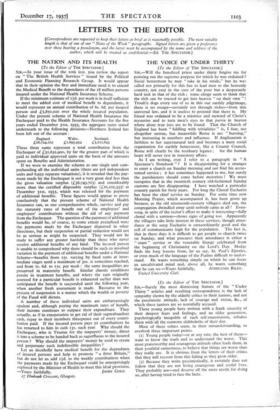THE VOICE OF UNDER THIRTY [To the Editor of THE
SPECTATOR.] Sut,—Will the beneficed priest under thirty forgive me for pointing out the supreme purpose for which he was ordained ? Social betterment he may " take in his stride," but he was called not primarily for this but to lead men to the heavenly country, not easy in the case of the poor but a desperately hard task in that of the rich ; some clergy seem to think that the rich can be trusted to get into heaven " on their own " ! Troub!e dogs every one of us in this our earthly pilgrimage, there is no escape—certainly not through riches—from this universal law, and it is useless to pretend that there is. My friend was ordained to be a minister and steward of Christ's mysteries and to turn men's eyes to that patria in heaven where alone true joys are to be found. That the Church of England has been " fiddling with trivialities " is, I fear, not altogether untrue, but meanwhile Rome is not " burning," but increasing in numbers and influence. If Anglicanism is faithless to her supernatural task and becomes a mere social organisation for earthly betterment, like a County Council, Rome will clearly be the residuary legatee ; for the human heart will never rest in transitory affairs.
As I am writing, may I refer to a paragraph in " A Spectator's Notebook " ? It is disappointing for a stranger to enter a church on Sunday morning and not find his accus- tomed service ; it has sometimes happened to me, but surely the parishioners should come before motorists ! We must recognise that in the twentieth century old-fashioned Sunday customs are fast disappearing. I have watched a particular country parish for forty years. For long the Choral Eucharist has been the chief service on Sunday. For some time now Morning Prayer, which accompanied it, has been given up because, as the old nineteenth-century villagers died out, the congregation dwindled away until nobody came at all ! Even- song, in spite of the rector's effort to make it interesting—fully choral with a sermon—shows signs of going too. Apparently the villagers take little interest in these services, though atten- dance at the sung Eucharist is extraordinarily good and the roll of communicants high for the population. The fact is, that in these days it is difficult to get people to church twice on Sunday, and what procures their attendance is either a " stunt " service or the venerable liturgy celebrated from the beginning of Christianity on the Lord's Day. Hodge finds the long lessons from, let us say, St. Paul's Epistles, or even much of the language of the Psalms difficult to under- stand. He wants something simple on which he can focus an uncultivated mind and, above all, he wants something that he can see.—Yours faithfully, ATHELSTAN RILEY. United University Club.














































 Previous page
Previous page